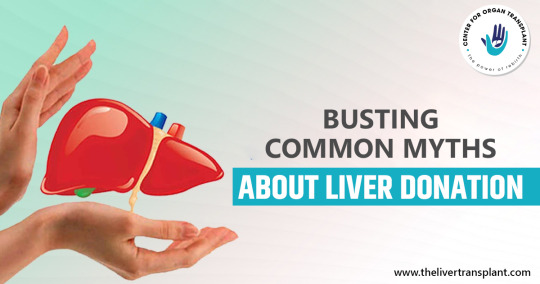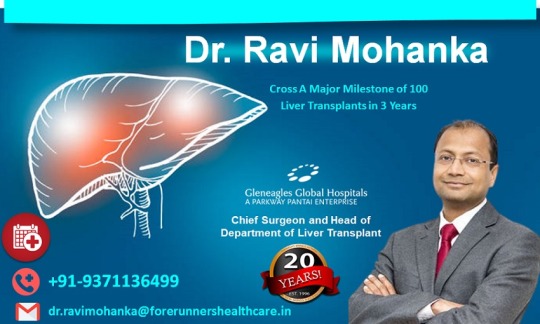#livertransplantspecialist
Text
Busting Common Myths About Liver Donation

Liver donation is a life-saving act that can give individuals a second chance at life. Despite its importance, there are several myths and misconceptions surrounding liver donation that can deter potential donors. In this blog, we aim to debunk these myths and provide accurate information to help you better understand the reality of liver donation.
Myth 1: Liver Donation is Risky and Dangerous
Fact: While any surgery carries some level of risk, advances in medical technology and surgical techniques have made liver donation a safe procedure. Living liver donors undergo a thorough evaluation to ensure they are healthy enough to donate. Skilled medical teams prioritize donor safety and provide comprehensive information about potential risks and benefits.
Myth 2: You Need to be Genetically Related to Donate a Liver
Fact: While genetic relatives can be potential liver donors, it is not a strict requirement. Living donors can be family members, friends, or even individuals who are not genetically related to the recipient. Compatibility is determined through medical and compatibility testing, ensuring the best match for a successful transplant.
Myth 3: Liver Donation Leads to Health Problems and Shortens Lifespan
Fact: Extensive research and studies have shown that liver donation does not significantly impact the donor's long-term health or lifespan. The liver is a regenerative organ, and the portion donated regrows in both the donor and recipient over time. Living liver donors are closely monitored before and after surgery to ensure their well-being.
Myth 4: Liver Donation Results in Weight Gain or Loss of Physical Ability
Fact: Liver donation does not cause sudden weight gain or loss of physical abilities. While recovery may involve temporary changes in diet and activity levels, donors can usually resume their regular routine as they heal. Over the long term, donors can lead normal, healthy lives with proper care and attention to their well-being.
Myth 5: Donating Part of Your Liver Means You Can't Drink Alcohol or Enjoy Regular Activities
Fact: While maintaining a healthy lifestyle is recommended for overall well-being, donors are not prohibited from enjoying moderate alcohol consumption or participating in regular activities after recovery. It's important to follow your medical team's guidance on post-operative care and any lifestyle adjustments.
In conclusion, it's vital to separate fact from fiction when considering liver donation. The decision to donate is a personal one that should be made based on accurate information, discussions with medical professionals, and consideration of the potential impact on your well-being. Living liver donation can save lives, and debunking these myths can help potential donors make informed choices that contribute to a brighter future for those in need. It is advisable to consult a Liver Specialist in India for Liver Transplant in India for accurate information and procedure.
#liver transplant#liversurgery#liversurgeon#livertransplantspecialist#liverhealth#organtransplant#organdonation#liverdonation#myths#facrs#liverdoctor#dr bipin vibhute#india#pune#best liver specialist in india#liver surgeon in maharashtra
0 notes
Text
3 Frequently Asked Questions about Alcohol Consumption
Alcohol is one of the most addictive drugs in the world. It is also estimated that nearly 3 million alcohol-related deaths occur worldwide each year.
There has been an increase in the amount of alcohol consumed by women around the world over time, making it a global concern. People are encouraged to think about drinking during Alcohol Awareness Week. It provides us with an opportunity to raise awareness and advocate for change. As part of Alcohol Awareness Week, we will discuss how alcohol affects the body, particularly women.
Q1) what happens when we consume alcohol?
What happens in the body: Alcohol is quickly transported throughout the body in the bloodstreams to all parts of the body after consumption. Until the liver breaks it down, alcohol remains in the bloodstream.
What happens in the Liver: By metabolising alcohol, the liver filters the blood and converts roughly 80 to 90 percent of it into acetaldehyde, which is extremely acidic and causes liver damage in our bodies (breaking it down with the help of enzymes like alcohol dehydrogenase). It also affects multiple organs such as the brain, heart, kidneys, and a variety of other organs.
Q2) what are the health hazards of drinking alcohol ?
Cancer: Women who drink alcohol are more likely to develop breast cancer and head and neck cancer.
Alcohol causes brain cell death, and women are more susceptible to this effect than men.
Pregnancy: If you are trying to conceive, please be aware that alcohol can impair a woman's ability to conceive. And, if you didn't realise you were pregnant and drank alcohol, the chances of harm are low, but you can consult with your doctor if you want. But keep in mind that drinking alcohol at any stage of pregnancy can be extremely dangerous for the baby and can have serious negative consequences for the unborn child. During pregnancy, no amount of alcohol is safe.
Victimization: Alcoholic women are more likely to be victims of sexual assault or other forms of abuse.
Depression and personal injury: In addition, alcohol consumption can contribute to depression, sleeping problems, heart failure, falls, and poor nutrition in women, particularly older women.
Q3) what is the impact of alcohol consumption?
General Outcomes:
It disrupts normal sleep.
Dehydrates both your body and your skin. It also depletes the skin of necessary vitamins and nutrients.
Put on weight. Did you know that two large glasses of wine have the same calorie count as a burger?
It reduces the amount of fat your body burns for fuel. Because we cannot store alcohol in our bodies, our bodies try to eliminate it as soon as possible. This process is more important than nutrient absorption and fat burning.
Other age-related side effects include:
Some menopausal symptoms may be exacerbated by alcohol. Menopause symptoms include hot flushes, night sweats, and weight gain. Alcohol frequently exacerbates these issues. Our bones gradually thin after menopause and as we age, and drinking alcohol can exacerbate this, increasing your risk of osteoporosis. (A condition that affects the bones, making them weak and brittle).
Severe Side Effects:
Depression
Dementia
Mental Health Issues
Alcoholic Hepatitis
Anaemia
Arrhythmias
Cirrhosis
Liver Disease.
Gout
High blood pressure
Nerve injury
Seizures
Stroke
Cardiomyopathy is a chronic heart muscle disease. Certain types of cancer
#liversurgeon#livertransplantsurgeon#liverspecialist#liverdoctor#mumbai#dradityananavati#pancreassurgeon#kidneytransplant#livertransplantspecialist
0 notes
Text

Specialist in Digestive Health: Gastroenterologist
A gastroenterologist is an expert physician focusing on diagnosing and treating conditions of the digestive tract, including the esophagus, stomach, intestines, colon, liver, pancreas, gallbladder, and bile ducts.
For premier liver transplant services, reach out at +91 82967 91847 or explore https://drmagnusjayaraj.com.
#DrMagnusJayaraj #DigestiveHealthExpert #LiverTransplantSpecialist #OptimalLiverHealth #DigestiveSystemCare #LiverWellness #ManagingLiverDisease #PromotingLiverAwareness #DedicatedLiverCare #EnhancingLiverFunction #SupportingLiverDetox #CherishYourLiver
0 notes
Link
Dr. Aditya J. Nanavati, Liver Transplant Specialist in Mumbai, Thane who provides surgical services in Cadaveric and Living donor liver transplantation.
1 note
·
View note
Text

Excellent medical team, clinical outcomes, affordable price range make this possible top liver transplant surgeon in Global Hospital Mumbai added another feather in its cap by conducting the 100th liver transplant at Global Hospital Mumbai, India.
Email: [email protected]
Send Reports for Opinion on : +91-9371136499
0 notes
Text
Liver Transplant Specialist in Punjab | SPS Hospitals
Looking for the best hospital in Punjab? SPS Hospitals in Ludhiana Punjab is a best multi-specialty hospital providing world-class treatment ... Hepatobiliary and Liver Transplant. Make an appointment here! http://spshospitals.com/liver-transplant-process
0 notes
Link
Prani health solutions have a chain of specialized hospitals, which are having an illustrious past in dealing with the patients, who have been facing problems pertinent to liver and opted for liver transplant.
0 notes
Text

Specialist in Digestive Health: Gastroenterologist
A gastroenterologist is an expert physician focusing on diagnosing and treating conditions of the digestive tract, including the esophagus, stomach, intestines, colon, liver, pancreas, gallbladder, and bile ducts.
For premier liver transplant services, reach out at +91 82967 91847 or explore https://drmagnusjayaraj.com.
#DrMagnusJayaraj #DigestiveHealthExpert #LiverTransplantSpecialist #OptimalLiverHealth #DigestiveSystemCare #LiverWellness #ManagingLiverDisease #PromotingLiverAwareness #DedicatedLiverCare #EnhancingLiverFunction #SupportingLiverDetox #CherishYourLiver
0 notes